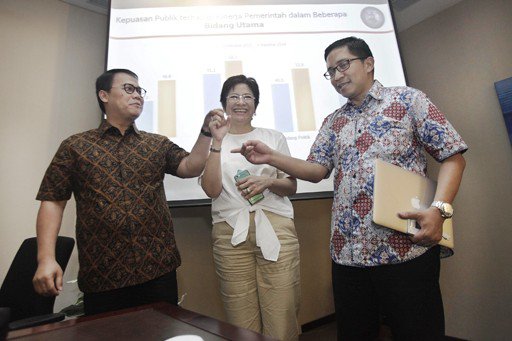Despite public outcry and criticism of some of his policies, President Joko “Jokowi” Widodo has maintained a high approval rating, a public opinion survey has found.
In recent months, Jokowi has been under fire for some controversies including the recent fiasco over the citizenship of Arcandra Tahar, the former energy and mineral resources minister. Jokowi’s tax amnesty programme has also been under scrutiny.
But all of this has not apparently impacted Jokowi’s popularity or his perceived acceptability. A recent study by the Jakarta-based Centre for Strategic and International Studies (CSIS) found that a majority of Indonesians approve of him and his performance in government.
Of the 1,000 respondents that the CSIS interviewed for the survey, 66.5 per cent said they were satisfied with the work of Jokowi’s administration. The survey recorded an 10.1 per cent increase in popularity from what the administration achieved last year.
The study found that Jokowi’s strongest approval rating came from male respondents who resided in villages across Java. According to the study, his supporters are mostly less educated and come from low-income groups.
They attribute their confidence in Jokowi’s administration to improvements in four sectors – the economy, law, politics and the maritime sector. Among these sectors, the administration’s economic performance was deemed the most lacking although respondents expressed confidence in the government’s commitment to improving the country’s economy.
CSIS researcher Arya Fernandes said the high approval rating was due to Jokowi’s priority programs to provide accessible health and education through the Health Care and Social Security Agency (BPJS Kesehatan), the Workers Social Security Agency (BPJS Ketenagakerjaan), the Indonesia Health Card (Kartu Indonesia Sehat), the Indonesia Smart Card (KIP) and the Prosperous Family Card (KKS).
“The majority of the people regard these services as beneficial to them,” Arya said on Tuesday.
The CSIS conducted the study from Aug. 8 to Aug. 15, not long after Jokowi announced his second Cabinet reshuffle.
The study found that public confidence in Jokowi’s ability to consolidate political support had also grown after two years of running the country. A majority, 56.8 per cent of respondents, perceived more harmonious relations between the executive and legislative bodies.
They are confident that Jokowi can successfully manage the big political coalition that currently supports his administration following the inclusion of the Golkar Party and the National Mandate Party (PAN).
With the Golkar Party and PAN joining with the government, there are 386 out of 560 legislative votes now guaranteed for Jokowi’s programs, with 113 opposition votes for the Gerindra Party and the Prosperous Justice Party and 61 “undecided” votes belonging to the Democratic Party, which claims itself to be neutral.
The large legislative support given to Jokowi appears to be a positive thing for some but not for Phillips Vermonte, head of the CSIS, who says it could potentially negate people’s voices.
“We don’t see an effective legislative body that checks the work of the government,” he said. “The government will be uncontrollable.”
Commenting on the study, Golkar politician Nurul Arifin said the party was long aware of Jokowi’s popularity, which motivated the party to nominate him for the 2019 presidential election.
“We have been to more than 50 regencies throughout the country and we can see the massive support from the locals for Jokowi as reflected in the study,” Nurul said. “It is clear where the support for Jokowi comes from. Thus, we will focus on nurturing these voters because they are the true voters despite criticisms of the government”.





